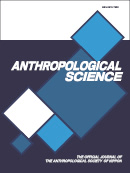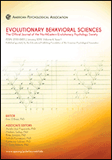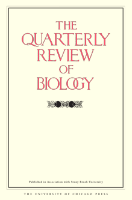
Evolutionary Human Sciences
Scope & Guideline
Innovating Insights into Human Behavior Through Evolutionary Science
Introduction
Aims and Scopes
- Evolutionary Psychology and Behavior:
The journal investigates how evolutionary principles influence human psychology and behavior, focusing on aspects such as mating strategies, kinship dynamics, and social cooperation. - Cultural Evolution:
Research published in the journal emphasizes the mechanisms of cultural transmission and evolution, exploring how cultural practices adapt and change over time in response to environmental and social factors. - Kinship and Family Dynamics:
There is a strong focus on kinship structures and family relationships, examining how these influence social behavior, investment patterns, and the evolution of norms across different cultures. - Interdisciplinary Approaches:
The journal promotes interdisciplinary research combining insights from anthropology, psychology, sociology, and biology to provide a comprehensive understanding of human evolution and behavior. - Environmental and Social Influences:
Studies often address how ecological contexts and social environments shape human behavior, including resource scarcity, climate change, and socio-economic factors.
Trending and Emerging
- Impact of Technology on Social Behavior:
Recent papers explore how technology, particularly social media and digital platforms, influences human relationships, cooperation, and cultural evolution, highlighting its growing relevance in contemporary research. - Resilience and Adaptation in Social Structures:
There is a rising interest in understanding how communities adapt to challenges such as climate change, economic inequality, and social conflict, emphasizing resilience as a key theme in human behavior. - Health and Evolutionary Perspectives:
Emerging research focuses on the interplay between health, disease, and evolutionary processes, examining how evolutionary perspectives can inform public health strategies and individual health behaviors. - Interconnectivity of Cultural Practices:
Studies increasingly explore the interconnectedness of cultural practices across different societies, particularly in the context of globalization and migration, revealing patterns of cultural exchange and adaptation. - Gender Dynamics and Evolving Norms:
The journal is witnessing a trend towards exploring evolving gender dynamics and norms, particularly in diverse cultural contexts, addressing issues of power, agency, and social change.
Declining or Waning
- Traditional Gender Roles and Norms:
Research focusing on traditional gender roles and norms, particularly in historical contexts, has seen a decline, with more emphasis shifting towards contemporary dynamics and the evolution of gender roles in modern societies. - Comparative Studies of Non-Human Primates:
While there has been significant interest in comparative studies of human and non-human primate behavior, recent publications suggest a waning focus on these comparisons, possibly due to a shift towards more human-centric research. - Static Cultural Analysis:
There appears to be a decrease in studies that analyze cultures in a static manner, with a growing preference for dynamic models that account for change and adaptation over time. - Emphasis on Individualism in Cultural Studies:
There has been a noticeable reduction in research emphasizing individualistic perspectives in cultural analysis, as more studies now consider collective behaviors and social networks. - Focus on Historical Anthropological Contexts:
The journal has seen fewer papers dedicated solely to historical anthropological contexts, indicating a potential shift towards contemporary issues and their implications for understanding current human behaviors.
Similar Journals

ANTHROPOLOGICAL SCIENCE
Unveiling the narratives of humanity through innovative methodologies.ANTHROPOLOGICAL SCIENCE is a prominent journal in the field of anthropology, published by the Anthropological Society of Nippon since 1993. With a rich pedigree of scholarly contributions, this journal is an essential platform for disseminating research findings and theoretical discussions that push the boundaries of anthropological knowledge. Currently ranked in the Q3 category in Anthropology by 2023 metrics, ANTHROPOLOGICAL SCIENCE boasts an impressive position at #163 out of 502 in Scopus, placing it in the 67th percentile among its peers. While it operates under a traditional access model, the journal supports a diverse range of anthropological research encompassing cultural, biological, and archaeological perspectives. Researchers, professionals, and students will find valuable insights and innovative methodologies that foster a richer understanding of human societies and behaviors. The current trends and findings published in this journal make it a crucial resource for those involved in anthropological studies or related fields.

Journal of Language Evolution
Connecting Minds Through the Evolution of LanguageThe Journal of Language Evolution, published by Oxford University Press, serves as a vital resource in the intersection of linguistics, psychology, and neuroscience. With an ISSN of 2058-4571, this prestigious journal has established itself as a prominent platform for innovative research since its inception in 2016, converging valuable insights up to 2023. It boasts notable rankings, including Q1 in Linguistics and Language and Q2 in both Developmental and Educational Psychology and Developmental Neuroscience, reflecting its high impact and relevance in the academic community. The journal is indexed in Scopus, where it ranks in the 93rd percentile for Linguistics and Language, showcasing its influence among leading scholars. Researchers, professionals, and students will find the journal’s rigorous analysis and interdisciplinary approach essential for advancing their understanding of language evolution and its broader implications. Although access is limited, the journal’s commitment to excellence positions it as a must-read for those engaged in these dynamic fields.

Nature Ecology & Evolution
Exploring the intricate web of life through cutting-edge research.Nature Ecology & Evolution is a premier journal that serves as a cornerstone for cutting-edge research in the dynamic fields of ecology, evolution, behavior, and systematics. Published by NATURE PORTFOLIO, this journal, with the ISSN 2397-334X, emphasizes high-quality, impactful studies that advance our understanding of ecological interactions and evolutionary processes. With an impressive Scopus ranking placing it in the 99th percentile—#6 out of 721 in Ecology, Evolution, Behavior and Systematics and #5 out of 461 in Environmental Science Ecology—it is classified as a Q1 journal, highlighting its significance in the research community. Established in 2016, it continues to foster an open dialogue among researchers and practitioners while facilitating the dissemination of transformative ideas that shape environmental policy and conservation strategies. While access to articles is restricted, the journal's robust impact factor underscores its relevance in scholarly discourse. Researchers, professionals, and students are encouraged to engage with the current trends and discoveries published in this leading journal, which thrives on addressing the challenges and complexities of our natural world.

Evolutionary Psychological Science
Bridging Evolutionary Theory and Human Behavior.Evolutionary Psychological Science, published by SpringerNature, is a critical platform in the field of social psychology, specifically tailored for researchers and professionals interested in the evolutionary perspectives that shape human behavior and societal interactions. Established in 2015 and set to continue its impact until 2024, this journal, with its E-ISSN 2198-9885, has garnered recognition within the academic community, achieving a notable Q2 ranking in social psychology, and securing a Scopus rank of #176 out of 310, placing it within the 43rd percentile. This open-access journal aims to disseminate innovative research that explores the interplay between evolutionary theory and psychological science, thereby enriching academic discourse and encouraging interdisciplinary collaboration. By providing a venue for rigorous scientific inquiry and practical applications, Evolutionary Psychological Science plays a vital role in advancing our understanding of human behavior through the lens of evolution.

HOMO-JOURNAL OF COMPARATIVE HUMAN BIOLOGY
Unveiling Insights into Human DiversityHOMO - Journal of Comparative Human Biology is a prestigious academic journal dedicated to advancing the field of comparative human biology, offering a platform for researchers, professionals, and students to disseminate cutting-edge findings. Published by E Schweizerbart'sche Verlagsbuchhandlung in Germany, this journal has been a crucial resource since its inception in 1950, featuring a rich archive of studies until 2023. It holds a Q3 quartile ranking in Anthropology and a Q4 quartile ranking in Miscellaneous Medicine, reflecting its significance and influence within the academic community. Although not an Open Access journal, it provides a wealth of robust research that intersects with various disciplines within the anthropological sciences. Researchers looking for a wide array of comparative studies and insights into human biology will find HOMO an invaluable addition to their scholarly resources.

ANNALS OF HUMAN BIOLOGY
Illuminating the Pathways of Human Health and DiseaseANNALS OF HUMAN BIOLOGY is a distinguished academic journal published by Taylor & Francis Ltd that focuses on the intersection of human biology and health sciences. With an ISSN of 0301-4460 and an E-ISSN of 1464-5033, this journal has been a pivotal resource for researchers and practitioners since its inception in 1974. Covering critical domains such as Aging, Epidemiology, Genetics, Physiology, and Public Health, it exemplifies an interdisciplinary approach that enhances our understanding of human biological variation and its implications for health and disease. While it currently does not offer Open Access, the journal maintains a respectable standing in its field with notable rankings in Scopus, reflecting its contributions to scientific knowledge. Its commitment to high-quality research and comprehensive review makes it an essential platform for scholars, healthcare professionals, and students seeking to explore the biological underpinnings of human health.

Evolutionary Behavioral Sciences
Connecting Evolutionary Theory and Behavioral ResearchEvolutionary Behavioral Sciences, an esteemed journal published by the American Psychological Association, offers a compelling platform for researchers and professionals engaged in the fields of Experimental and Cognitive Psychology and Social Psychology. With an ISSN of 2330-2925, this journal has been a vital resource since its inception in 2014, aiming to bridge the gap between evolutionary theory and behavioral science, thereby fostering an interdisciplinary dialogue among scholars. Despite its current Q3 ranking in both relevant categories, it is poised for growth and increased visibility within the academic community, addressing contemporary issues through rigorous empirical research and theoretical advancements. Access to the journal is restricted, which bolsters its scholarly integrity, while its publication from one of the leading psychological associations signifies its commitment to excellence in behavioral research. Through the convergence of innovative studies and evolving methodologies, Evolutionary Behavioral Sciences underscores the importance of understanding human behavior from an evolutionary perspective, making it an essential read for anyone interested in the dynamics of behavior, cognition, and social interaction.

Evolutionary Bioinformatics
Transforming evolutionary studies with cutting-edge techniques.Evolutionary Bioinformatics, published by SAGE Publications Ltd, is a pioneering open-access journal established in 2005, dedicated to advancing the field of evolutionary biology through innovative computational techniques and bioinformatics. With an ISSN of 1176-9343, it serves as a critical platform for researchers, professionals, and students to disseminate impactful findings and foster collaboration across disciplines. The journal spans a broad scope, contributing significantly to the areas of Ecology, Evolution, Behavior and Systematics, and Genetics, as evidenced by its respectable Scopus rankings and quartile placements in 2023. With a commitment to providing comprehensive, peer-reviewed research articles and tools for sharing knowledge, Evolutionary Bioinformatics plays an essential role in shaping the future of evolutionary studies and bioinformatics. Readers and contributors alike are encouraged to engage with cutting-edge research that pushes the boundaries of understanding in this dynamic field.

QUARTERLY REVIEW OF BIOLOGY
Cultivating Excellence in Biological ScholarshipQUARTERLY REVIEW OF BIOLOGY, published by University of Chicago Press, stands as a premier journal dedicated to the dissemination of high-quality research and review articles in the field of biological sciences. With an impressive impact factor and an esteemed ranking of Q1 in the Agricultural and Biological Sciences category, the journal is a vital resource for researchers, professionals, and students aiming to stay at the forefront of biological research and developments. Since its inception in 1945, the journal has evolved to cover a broad scope of topics, fostering interdisciplinary dialogue and providing critical insights that promote scientific advancement. Although currently not an open access journal, its reputation is underscored by a remarkable standing in the 95th percentile across Scopus rankings within its field. Located in Chicago, Illinois, this journal continues to be a cornerstone for scholarly communication in biology, making valuable contributions to both academia and practical applications in the biological sciences.

Evolutionary Psychology
Transforming Psychological Research with Evolutionary PerspectivesEvolutionary Psychology is a crucial journal published by SAGE Publications Inc, dedicated to exploring the intersection of psychological sciences and evolutionary theory. Established as an Open Access platform since 2003, this journal aims to facilitate the dissemination of groundbreaking research that examines how evolutionary processes shape human behavior and cognitive functions. With a range of articles that cater to various aspects of psychology, especially in fields such as Behavioral Neuroscience, Social Psychology, and general Medicine, the journal holds significant relevance in contemporary academic discourse. Although it currently resides in the lower quartiles (Q4 and Q3) in its respective categories, it provides a vital space for innovative ideas and perspectives, inviting researchers and students to contribute and engage with the rapidly evolving understanding of human psychology through an evolutionary lens. The journal is indexed with an ISSN of 1474-7049, ensuring broad accessibility and outreach to a global audience.